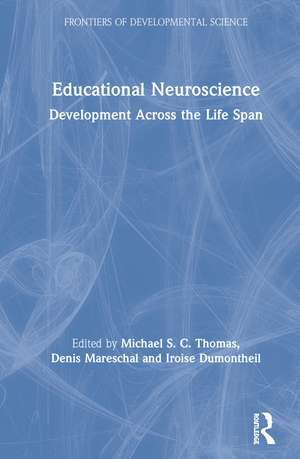Educational Neuroscience: Development Across the Life Span: Frontiers of Developmental Science
Editat de Michael S. C. Thomas, Denis Mareschal, Iroise Dumontheilen Limba Engleză Hardback – 15 apr 2020
Thomas, Mareschal, Dumontheil, and the team of expert international contributors assembled in this volume thoroughly explore four main themes throughout the book. The first theme is individual differences, or what makes children perform better or worse in the classroom. The second theme is the nature of individual differences at different stages in development, from early years into adulthood. The third theme addresses cognitive enhancement, summarizing research that has investigated activities that might give general benefits to cognition. And the fourth theme considers the translation of research findings into classroom practices, discussing broader ethical issues raised by educational neuroscience, and what teachers need to know about neuroscience to enhance their day-to-day practice. Specific topics explored include neuropsychological perspectives on socioeconomic disparities in educational achievement, reading difficulties, phonological skills, executive function, and emotional development.
Educational Neuroscience is essential reading for researchers and graduate students of educational psychology, developmental science, developmental psychology, and cognitive psychology, especially those specializing in emotion regulation.
| Toate formatele și edițiile | Preț | Express |
|---|---|---|
| Paperback (1) | 514.16 lei 3-5 săpt. | +41.95 lei 6-12 zile |
| Taylor & Francis – 15 apr 2020 | 514.16 lei 3-5 săpt. | +41.95 lei 6-12 zile |
| Hardback (1) | 1124.35 lei 6-8 săpt. | |
| Taylor & Francis – 15 apr 2020 | 1124.35 lei 6-8 săpt. |
Preț: 1124.35 lei
Preț vechi: 1371.15 lei
-18% Nou
Puncte Express: 1687
Preț estimativ în valută:
215.14€ • 224.19$ • 178.14£
215.14€ • 224.19$ • 178.14£
Carte tipărită la comandă
Livrare economică 03-17 aprilie
Preluare comenzi: 021 569.72.76
Specificații
ISBN-13: 9781138240346
ISBN-10: 1138240346
Pagini: 570
Ilustrații: 28
Dimensiuni: 152 x 229 x 32 mm
Greutate: 0.89 kg
Ediția:1
Editura: Taylor & Francis
Colecția Routledge
Seria Frontiers of Developmental Science
Locul publicării:Oxford, United Kingdom
ISBN-10: 1138240346
Pagini: 570
Ilustrații: 28
Dimensiuni: 152 x 229 x 32 mm
Greutate: 0.89 kg
Ediția:1
Editura: Taylor & Francis
Colecția Routledge
Seria Frontiers of Developmental Science
Locul publicării:Oxford, United Kingdom
Cuprins
Introduction
- Why is neuroscience relevant to education?
- An introduction to brain and cognitive development – the key concepts you need to knowDevelopment and variation: Nature vs. Nature
- What has behavioral genetic research told us about the origins of individual differences in educational abilities and achievements?
- Socioeconomic disparities in achievement: Insights on neurocognitive development and educational interventionsDiscipline-specific abilities: literacy, numeracy, and science
- Neuroscience in reading and reading difficulties
- Reading acquisition and developmental dyslexia: Educational neuroscience and phonological skills
- Sources of variability in mathematical development
- Lifespan conceptual development in science: brain and behaviourDiscipline-general abilities: executive functions, social and affective development
- The development of executive functions in childhood and adolescence and their relation to school performance
- Understanding emotional thought can transform educators’ understanding of how students learnLeading methods for cognitive enhancement
- Action video games: from effects on cognition and the brain to potential educational applications
- Mindfulness and executive function: Implications for learning and early childhood education
- The neuroscience of sleep and its relation to educational outcomes
- The effectiveness of aerobic exercise for improving educational outcomes
- The cognitive benefits and disadvantages of bilingualism across the lifespan and implications for education
- Music training, individual differences, and plasticityInto the classroom
- Towards a science of teaching and learning for teacher education
- Educational neuroscience: ethical perspectives
- Educational neuroscience: so what does it mean in the classroom?Conclusion
- Key challenges in advancing educational neuroscience
Notă biografică
Michael S. C. Thomas obtained his PhD from the University of Oxford and completed a postdoctoral fellowship at the UCL Institute of Child Health. His research in developmental cognitive neuroscience focuses on the origins of cognitive variability, including developmental disorders. He is Director of the University of London Centre for Educational Neuroscience, UK.
Denis Mareschal is Director of the Centre for Brain and Cognitive Development, University of London, UK. He has published extensively on all aspects of learning and development across infancy and childhood and is a recipient of the Marr Prize (Cognitive Science Society, USA), the Young Researcher Award (International Society on Infant Studies, USA), and the Margaret Donaldson Prize (British Psychological Society, UK).
Iroise Dumontheil obtained a PhD from the University of Paris VI and then was a postdoctoral fellow in labs in London, Cambridge and Stockholm. She is a recipient of the Spearman Medal (British Psychological Society) and the Elizabeth Warrington Prize (British Neuropsychological Society). Her research focuses on the typical development of the brain, cognition and behaviour during adolescence, and on the implication of these findings for education.
Denis Mareschal is Director of the Centre for Brain and Cognitive Development, University of London, UK. He has published extensively on all aspects of learning and development across infancy and childhood and is a recipient of the Marr Prize (Cognitive Science Society, USA), the Young Researcher Award (International Society on Infant Studies, USA), and the Margaret Donaldson Prize (British Psychological Society, UK).
Iroise Dumontheil obtained a PhD from the University of Paris VI and then was a postdoctoral fellow in labs in London, Cambridge and Stockholm. She is a recipient of the Spearman Medal (British Psychological Society) and the Elizabeth Warrington Prize (British Neuropsychological Society). Her research focuses on the typical development of the brain, cognition and behaviour during adolescence, and on the implication of these findings for education.
Descriere
Thomas, Mareschal, Dumontheil and the team of expert international contributors explore four main themes throughout the book. Specific topics explored include neuropsychological perspectives on socioeconomic disparities in educational achievement, reading difficulties, phonological skills, executive function and emotional development.





